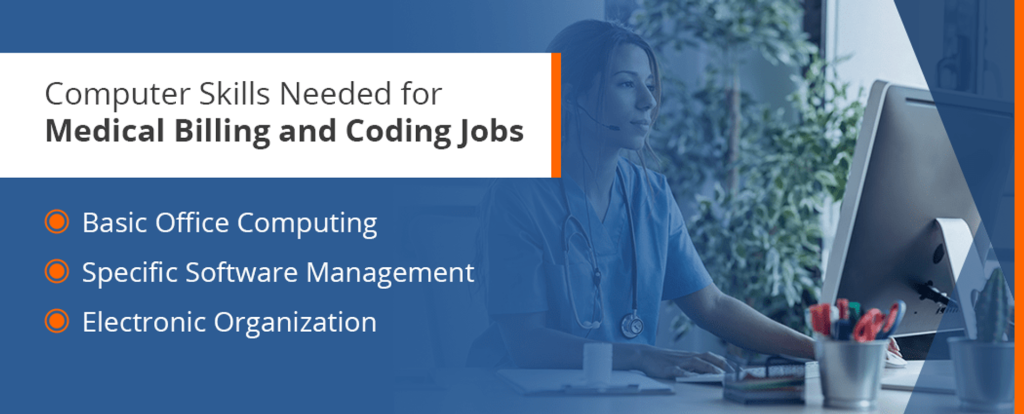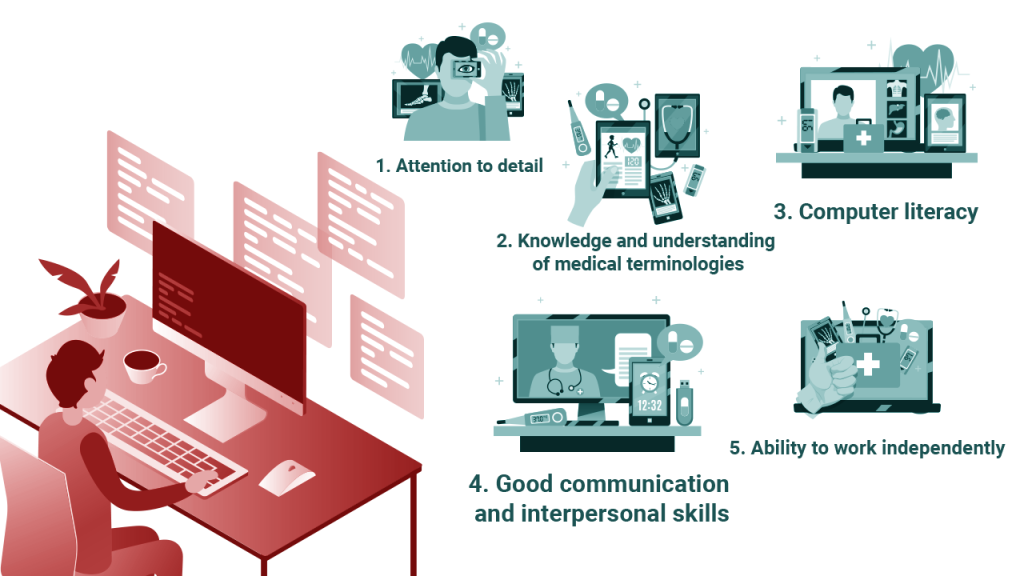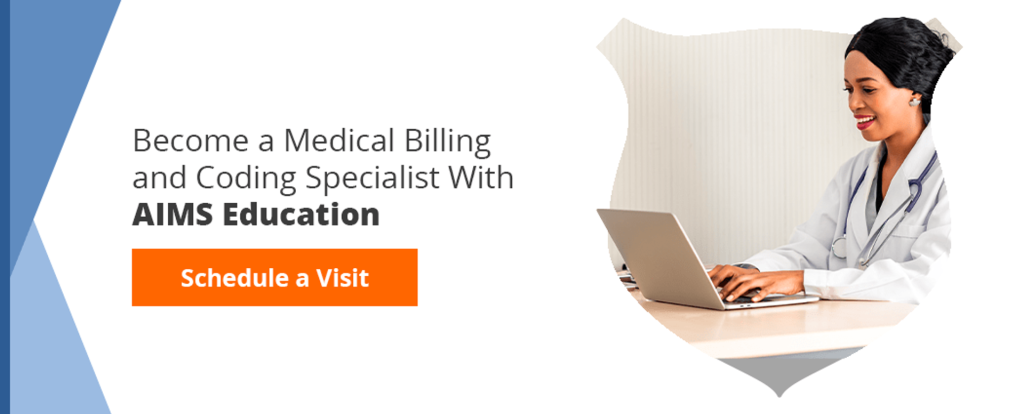In this article, we will discuss the essential computer skills required for a career in medical billing and coding. You will learn about the importance of proficiency in medical billing software, knowledge of electronic health records (EHR) systems, and familiarity with coding languages such as CPT and ICD-10. We will also explore the significance of data entry accuracy, attention to detail, and the ability to navigate complex databases. By the end of this article, you will have a clear understanding of the computer skills necessary for success in the field of medical billing and coding.

Understanding Medical Billing and Coding
Medical billing and coding are integral to the healthcare industry. They involve the process of translating medical procedures, diagnoses, and other healthcare services into universally recognized codes. These codes are crucial for insurance claims, reimbursements, and maintaining accurate patient records.
What is medical billing?
Medical billing refers to the process of generating bills and invoices for healthcare services provided to patients. It involves understanding insurance policies, submitting claims to insurance companies, and following up on payments. Medical billers need to have a thorough understanding of insurance terminology, reimbursement methods, and coding guidelines.
What is medical coding?
Medical coding, on the other hand, is the process of assigning specific codes to medical procedures, diagnoses, and treatments. These codes serve as a universal language that allows for accurate and standardized documentation. Medical coders play a vital role in healthcare facilities by ensuring that medical records are coded correctly and in compliance with industry regulations.
Importance of medical billing and coding in healthcare
Accurate medical billing and coding are essential for several reasons. First and foremost, they ensure that healthcare providers receive proper reimbursement for their services. Medical billing also facilitates efficient financial management within healthcare organizations by tracking revenue, identifying trends, and managing accounts receivable.
Medical coding, on the other hand, contributes to effective patient care and research. Accurate coding helps healthcare providers maintain comprehensive medical records, which in turn improves patient outcomes. Moreover, medical coding allows for the analysis of health trends, disease patterns, and the effectiveness of different treatments.
Basic Computer Skills
In today’s digital age, basic computer skills are a necessity in almost every industry, including medical billing and coding. Here are some essential computer skills that you need to possess or develop to excel in this field:
Proficiency in using Microsoft Office Suite
Proficiency in using Microsoft Word, Excel, and PowerPoint is vital for medical billing and coding professionals. Word processing software like Microsoft Word allows you to create and format documents required for billing and coding purposes. Excel enables you to handle financial calculations, create spreadsheets, and analyze data. PowerPoint is useful for creating presentations and sharing information with colleagues or clients.
Data entry skills
Accurate and efficient data entry skills are essential in medical billing and coding. You will need to input large amounts of data, including patient information, diagnostic codes, and billing details. Developing strong data entry skills will help you work efficiently and reduce the chances of errors in patient records.
Understanding of computer hardware and software
Having a basic understanding of computer hardware and software is important for troubleshooting issues that may arise while working with medical billing and coding systems. This knowledge will also help you communicate effectively with IT professionals when seeking technical support or implementing new software.
Operating system knowledge
Familiarity with different operating systems, such as Windows or macOS, is necessary to navigate computer interfaces and perform various tasks. Understanding how to manage files, install software, and customize settings within an operating system will enhance your overall computer skills.
Medical Billing Software
Proficiency in medical billing software is crucial for medical billing and coding professionals. Here are some key aspects related to medical billing software:
Knowledge of popular medical billing software programs
There are several medical billing software programs available in the market, such as Epic, Cerner, and Medisoft. Familiarity with these programs, their features, and functionality is highly beneficial in managing billing and coding tasks efficiently.
Ability to navigate and utilize software features
Medical billing software often has multiple features and modules, including patient registration, claims processing, and appointment scheduling. Understanding how to navigate through these features and efficiently utilize them will improve your productivity and efficiency.
Understanding of electronic health records (EHR)
Electronic health records (EHR) are digital versions of a patient’s medical history, including diagnoses, treatments, and medications. Medical billing and coding professionals frequently work with EHR systems to access and update patient information, ensuring accurate billing and coding.
Medical Coding Systems
Medical coding systems serve as the foundation for accurate coding in medical billing. Here are some essential aspects related to medical coding systems:
Familiarity with medical coding systems such as ICD-10 and CPT
ICD-10 (International Classification of Diseases, 10th Revision) and CPT (Current Procedural Terminology) are the two main coding systems used in medical billing and coding. Familiarity with these coding systems, their guidelines, and updates is necessary to assign accurate codes to medical procedures and diagnoses.
Ability to assign accurate codes based on documentation
Medical coders must have the ability to analyze medical documentation, such as patient records, clinical notes, and lab results, to assign the appropriate codes. Accuracy in coding is crucial for insurance claims, billing, and maintaining the integrity of patient records.
Knowledge of coding guidelines
Coding guidelines provide specific instructions and rules for assigning codes in different medical scenarios. Familiarizing yourself with coding guidelines, such as those provided by the American Medical Association (AMA) or Centers for Medicare and Medicaid Services (CMS), is essential for accurate and compliant coding.

Health Information Management
Health information management (HIM) plays a crucial role in the healthcare industry. Here are some aspects related to health information management:
Understanding of health information management principles
Health information management involves the collection, organization, and secure storage of patient information. Understanding the principles and processes involved in managing health information ensures the confidentiality, integrity, and availability of patient records.
Confidentiality and data security protocols
Medical billing and coding professionals handle sensitive patient information, making confidentiality and data security a top priority. Understanding and adhering to privacy regulations, such as the Health Insurance Portability and Accountability Act (HIPAA), is essential to protect patient privacy and prevent data breaches.
HIPAA compliance
HIPAA compliance involves following the regulations set by the U.S. Department of Health and Human Services to safeguard patient health information. Medical billing and coding professionals must have a thorough understanding of HIPAA regulations to ensure compliance in their daily work.
Medical Terminology
Medical terminology forms the basis for understanding and communicating medical concepts. Here are some important aspects related to medical terminology:
A solid foundation in medical terminology
Having a solid foundation in medical terminology is crucial for medical billing and coding professionals. Understanding medical terms, prefixes, suffixes, and root words allows you to interpret and assign accurate codes based on medical documentation.
Ability to interpret medical documentation
Medical billing and coding professionals need to interpret medical documentation, such as progress notes, operative reports, and discharge summaries, to accurately assign codes. Comprehensive knowledge of medical terminology enables you to understand and extract relevant information from these documents.
Understanding of anatomy, physiology, and disease processes
A fundamental understanding of anatomy, physiology, and disease processes is necessary for accurate medical coding. Knowing the different body systems, their functions, and common diseases helps you assign accurate codes and contributes to the overall accuracy of patient records.

Communication Skills
Effective communication is crucial in any healthcare setting, including medical billing and coding. Here are some important aspects related to communication skills:
Effective verbal and written communication in a healthcare setting
Medical billing and coding professionals often interact with healthcare providers, insurance companies, and patients. The ability to communicate clearly and effectively, both verbally and in writing, is important for conveying information, addressing concerns, and resolving issues.
Interacting with healthcare professionals and patients
Interacting with healthcare professionals and patients requires effective communication skills. Medical billing and coding professionals may need to clarify medical documentation, obtain additional information, or discuss billing and coding-related matters. The ability to communicate professionally and compassionately is crucial in building positive relationships.
Clear and concise documentation
Accurate documentation is a cornerstone of medical billing and coding. Being able to clearly and concisely document coding decisions, billing information, and communications ensures that the necessary information is available for review, audit, and reimbursement purposes.
Attention to Detail
Attention to detail is a critical skill for medical billing and coding professionals. Here are some important aspects related to attention to detail:
Ability to review and analyze medical records
Reviewing and analyzing medical records requires a keen eye for detail. Medical billing and coding professionals need to identify and extract relevant information from patient records to assign accurate codes and ensure proper billing.
Identifying discrepancies and errors
Medical records can contain errors, discrepancies, or missing information that may impact coding and billing accuracy. Medical billing and coding professionals need to be vigilant in identifying inconsistencies, verify information, and rectify errors to maintain the integrity of patient records.
Maintaining accuracy in billing and coding
Attention to detail is crucial to maintain accuracy in medical billing and coding. Small errors, such as incorrect codes or missed charges, can lead to claim denials, payment delays, and financial loss for healthcare providers. Attention to detail ensures accurate billing and coding, contributing to the overall efficiency of healthcare operations.

Problem-Solving and Analytical Skills
Problem-solving and analytical skills are essential in medical billing and coding. Here are some important aspects related to these skills:
Troubleshooting billing or coding issues
Medical billing and coding professionals often encounter complex billing or coding issues that require problem-solving skills. These professionals need to analyze the situation, identify the root cause of the problem, and propose solutions to resolve the issue and prevent recurrence.
Analyzing complex medical cases
Some medical cases may present unique challenges in coding and billing. Medical billing and coding professionals need strong analytical skills to analyze complex medical cases, research coding guidelines, and make informed decisions regarding code assignment.
Critical thinking in resolving coding conflicts
Coding conflicts may arise when determining the most appropriate code for a particular medical procedure or diagnosis. Medical billing and coding professionals need critical thinking skills to evaluate conflicting information, consult coding guidelines, and make decisions based on the best available evidence.
Conclusion
In conclusion, computer skills play a crucial role in the field of medical billing and coding. Proficiency in using the Microsoft Office Suite, data entry skills, and understanding computer hardware and software are essential for success in this field. Additionally, knowledge of medical billing software programs, medical coding systems, health information management principles, medical terminology, communication skills, attention to detail, and problem-solving and analytical skills are also crucial.
The significance of computer skills in medical billing and coding lies in their contribution to efficient healthcare operations. Accurate coding and billing ensure proper reimbursement for healthcare services, contribute to effective patient care and research, and assist in financial management within healthcare organizations. Being equipped with the necessary computer skills will enable you to excel in the dynamic field of medical billing and coding and contribute to the overall efficiency of the healthcare industry.

